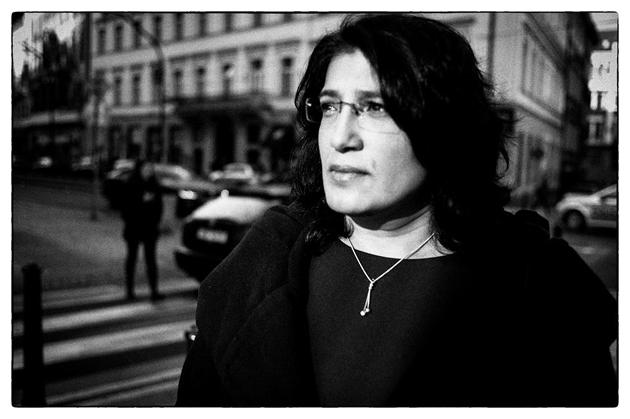Monika Mihaličková: In Romanes we never say "Me som cikános" ["I am a gypsy"]

Romale, recently I have very frequently encountered debates on the subject of whether we are Roma or “gypsies”. I comprehend that this society is confused and does not know what name to call our nation.
People here do not know where to go to learn what is correct, and some even say that the word “gypsy” is “older” than the word “Rom”. The term “gypsy” has its historical origin in the Greek word Athinganoi.
PhDr. Jana Horváthová, the director of our Museum of Romani Culture, who is an historian, has written the following in the book Chapters from the History of the Roma: “According to some researchers, the word Athinganoi was a designation for members of a foreign, heretical sect that was dedicated to fortune-telling and black magic in the area of Anatolia (Asia Minor).” We were labeled with that name in the past.
That is what outsiders called us. However, if you can speak Romanes, you know that in the Romani language we never say “Me som cikán” [“I am a gypsy”].
It sounds rather strange, right? We don’t even say “Me som cikános“.
That sounds funny in Romanes, don’t you agree? If we want to identify ourselves in the Romani language, we say of ourselves: “Me som Rom, me som Romňi” [“I am a Romani man/woman”].
We do not have to refer to historical sources to know which word we already use to designate our own nationality. Be that as it may, I have been hearing and reading the following on online social networking sites rather frequently recently: “I am a gypsy [cigán] and I am not ashamed of it!”
This is, understandably, a reaction that comes from us, from Romani people, and what is positive about it is the fact that by now absolutely nothing can insult us. We have accepted this designation for us by the outsiders with detachment.
“OK, even if you call me ‘gypsy guy’, ‘gypsy girl’, it’s all the same to me,” we say. “Gypsy”, however, is in its original meaning an epithet, an insult, it embodies many different meanings depending on the individual who is labeling somebody else with it and depending on the individual so being labeled.
Go ask somebody what comes to mind when the word “gypsy” is said. Ask people to describe the image that comes to mind for that term.
You all might be very surprised at how different people’s concepts of the meaning of that word are from one another. At this juncture, many smart alecks usually raise this objection: “What about the film ‘Queen of the Gypsies‘? Is that bad too? Or the song ‘You Beautiful Gypsy Girl’ (‘Cikánko, ty krásná‘)? Is that also insulting? What will you come up with next?”
Do you like the song “You Beautiful Gypsy Girl?” Do you really?
That’s great. I do not.
My dislike is not because of its title – simply put, it’s a folk song that is foreign to me. I do not feel that song has anything to do with our own Romani songs.
Amen na giľavas giľa, kaj o gadžo merel pale amari romani čhaj. We Romani people have grown up with our own songs, with our own lyrics in which you will never find the word “gypsy”.
That word does not fit with our Romani lyrics. It simply would not work no matter how hard we tried.
Romale, I know that many of you know all of this already. What I want to say to you, and what I want to ask of you, as a Romani woman, is very important for all of us.
Let’s unite and speak of ourselves as Roma. Leave the term “gypsies” to those who are uneducated and who basically don’t even what to learn anything.
Speak about this with those who want to know something more. Explain the correct usage to them and how we say this in Romanes.
Do not argue with anybody, do not insult anybody, do not scold anybody. Do not behave like those who want their words to harm those around them.
Just calmly explain it to them. For those of you who are of Romani origin, and who fiercely support calling yourselves “gypsies”, and who do not speak Romanes, I have just one recommendation.
Go visit somebody in your family, your grandma, your grandpa, or somebody who speaks Romanes, and ask them about this. Have them say this to you in Romanes.
You will feel and you will see in their eyes the great difference between their saying to you, in Czech, “I am a gypsy man/woman” or in Romanes: “I am a Romani man/woman”. You all may also have noticed that in this piece I am writing the words cikán or cigán (“gypsy”) with a small “c”.
On the other hand, the word Rom (Romani man) and Romka (Romani woman) is written here with a capital “R”. According to the rules of Czech grammar, this is correct, its the same as if I were to write Czech man or Czech woman (Čech, Češka).
The names of members of nations or nationalities are written with a capital letter at the beginning of a word in Czech. These details are important!
Ča amen šaj phenas, ko sam. Na o manuša avral.
Paľikerav tumenge, Romale. Pijen, khelen, mulatinen pre Karačoňa!
He me oda kerava. Ačen devleha.
Chapters from the History of the Roma, Jana Horváthová
Romani people arrived in Europe through Asia Minor and the Balkans, i.e., areas that belonged to what was called the Byzantine Empire. The presence of the Roma in Byzantium or even on the European continent can be, with a great degree of likelihood, assumed to have begun from at least the 12th century (maybe even much earlier), but we must not expect to unequivocally be able to document that impression in historical sources. If written works from those times seem to refer to Romani people, it is not absolutely clear whether those people actually were Roma. The historical data from the 12th and 13th centuries that is cited repeatedly by various authors as involving references to Roma remains uncertain.
The information contained in a chronicle authored by an unidentified monk in the monastery on Mount Athos in Greece from around 1068 most probably actually does refer to Roma. It discusses people called Atsínganoi (Atsigános, Athinganoi) moving about the Constantinople area.
According to some researchers, the word Athinganoi was a designation for members of a foreign, heretical sect who dedicated themselves to fortune-telling and black magic in the area of Anatolia (Asia Minor). The Roma are said to have been erroneously identified with that sect, as they also devoted themselves to magic, were visually very distinct from the local population, and in addition, came from the same area. By staying on the territory of Asia Minor, Romani people had been able to assume some elements of local culture and customs that were typical of the Athinganoi sect. It is, however, also possible, as some Byzantologists believe, that the term Athinganoi was, from the beginning, used to name exactly the Roma. They could have been designated as a sect of heretics by the church authorities because they engaged in activities and practices that were, from the perspective of those times, dangerous and therefore condemned. According to the clergy, people were supposed to avoid encountering such heretics, and primarily, they were not supposed to allow such people into their homes, “as they teach Devilish matters”.
Whether Romani people were actually Athinganoi, or whether they were, during the early Middle Ages, erroneously identified with members of this foreign, heretical group, does not alter the fact that the designation Athinganoi – Atsigános gave rise to one of the most widespread designations for Romani people in Europe: [in Czech] Cikán, in German, Zigeuner, in Italian, Zingar, in French, Tsigan, in Hungarian, Cigány, etc.). It is essential that the word Athinganoi had, from the beginning, a negative connotation that was never abandoned during its gradual transformation into the expression “Cikán” [“Gypsy”]. It is symptomatic of the relationship of majority societies to the Romani minority that the Roma were designated by those around them with this term – they did not create it themselves, or at least they only accepted its use later on; but Roma have never identified unreservedly with the designation of “Gypsy”.
Similarly, in the Arctic, the Inuits have never accepted the designation “Eskimo”, which means “eaters of raw meat”, and the indigenous inhabitants of the Americas, divided among a number of often hostile tribes, have never accepted the collective label of “Indian” (which, as it happens, also comes from an error based on Columbus mistaking the American continent for India).
